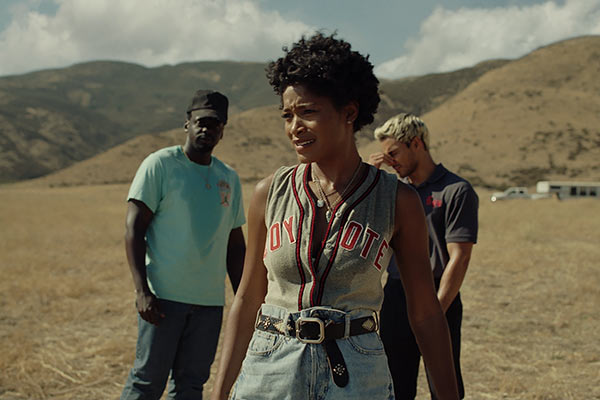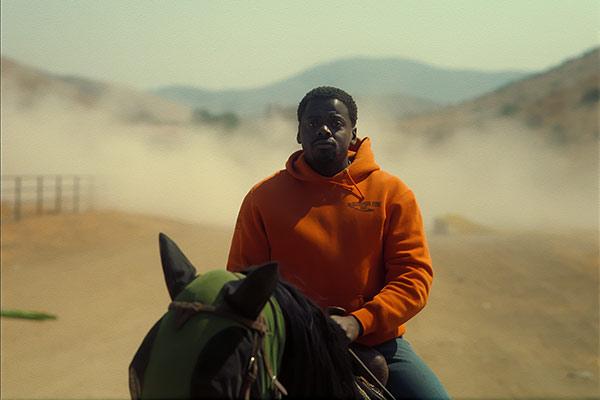Oscar winner Jordan Peele managed to disrupt and redefine modern horror with his films 'Get Out' and 'Us’.
Now, Jordan returns, presenting audiences with 'NOPE', starring Daniel Kaluuya, Keke Palmer, Steven Yeun, Michael Wincott and Brandon Perea.
The expansive horror epic sees residents in a lonely gulch of inland California as they bear witness to an uncanny, chilling discovery. Meanwhile, the owner of a theme park attempts to profit from the otherworldly phenomenon.
To say too much more would give it all away. Here, before the film hits cinemas, Writer, Producer and Director Jordan Peele talks about all the elements that bring 'NOPE' together.
Your films are so unique and different to everything else. What was the genesis of 'NOPE'?
It’s hard to talk about the genesis without giving anything away, but I felt there was this vacuum of a movie that I wish existed but also that didn’t – which was the big, horror, UFO film. In some ways, I felt I had the responsibility to take that on. So, the idea, concept and plot started from there.
What was your main inspiration to write it?
Humanity, like all my films, combined with the feeling of existential helplessness. Then I targeted this idea of spectacle, to bring people out to the theatres and help invigorate their love for the cinematic experience, and at the same time I asked myself the reason why we are obsessed with spectacle. Why is the human condition such that we have this addiction to witnessing magic, be it beautiful or horrific?
At the core of the story there is a relationship between two siblings that are very different but have a special bond, right?
Yes, it’s a story about home and two siblings – OJ and Emerald Haywood – who have a connection and a bond to rediscover during the film. I think they represent two halves that most of us have in us. There is a part of me that is Emerald, wanting to be out there getting the laugh and the appraisal, and another part that is OJ, socially nervous and uncomfortable. I’m an only child, but I’m fascinated with the sibling relationship because it is based on a primal genetic sort of loyalty, with something special beneath. No matter how much they can go at each other’s throats or how much their existence is defined by being different to one another, they will come to support each other at the end. So, I wanted to tell a tale about that because it’s something that always brings me a great deal of heart, joy, and melancholy.
And what did two actors of the caliber of Daniel Kaluuya – whom you had already worked with on 'Get Out' – and Keke Palmer bring to those roles?
They are such different performers with such different backgrounds, and they both embodied their characters so wonderfully. These are characters that act as foils to each other, and as soon as we got these actors together you could just see them starting to become Emerald and OJ and how real that relationship was. It even got to the point where I didn’t have to talk to them much or tell them how they felt towards each other, because they knew. Daniel Kaluuya and Keke Palmer complement one another so much, and in essence made each other’s characters. So, the scenes where they are together are magical, and their bond is real.
How did Daniel react when you told him he would spend a large part of the movie on a horse?
Initially, not great, but I will say that I have never seen an actor work as hard as he did to get the horse skills together. It’s just wonderful to watch his process, because from the first day I met him on 'Get Out' and told him I needed him to get the accent right, he has been flawless. Then on this film he said that the next time I saw him he would be a horse rider, and basically that’s what happened.
And you also have rich complex supporting characters that add a lot to the movie.
I’m inspired by directors like Paul Thomas Anderson, Robert Altman and Quentin Tarantino, because they don’t take any character for granted. I was blessed to fill the supporting roles with massive talents.
Image © Universal Studios. All Rights Reserved.
The film is also epic in scale and visually stunning.
My director of photography, Hoyte van Hoytema, was an absolute pleasure to work with and a true genius. I believe he is the only cinematographer who could have forged the ground – both artistically and technically – to achieve some of the things we pulled off in this film. We did some things with large-format and IMAX cameras that I’ve never seen done. The heart and soul of the movie is about capturing the impossible on camera. When I asked Hoyte what he would use if he had to film a flying saucer for posterity, he said he would use an IMAX camera, just because of the resolution.
How would you explain your relationship to symbolism?
My relationship to symbolism in my films has grown to become a little bit more organic, regarding how symbols manifest and what they mean. During the course of a process, you find connections in things, and so much of telling a story and moviemaking starts with something you don’t know and trying to understand what you have been trying to tell yourself. So, you can’t sort of decide what symbols are, but rather let them show you what they are.
The use of name cards in the narrative is quite original and fascinating too.
Without going too deep into what that is about, I think 'NOPE' structurally feels different to other films, and there are departures from traditional storytelling in it. I feel that the name cards helped an audience know how to watch the film and understand that this was not going to be the most straightforward style of narrative, in a movie where you were going to have to pay attention in a different way.
Image © Universal Studios. All Rights Reserved.
'NOPE' transcends and reimagines genres, to the point where it is impossible to place in a box. How important is that to you?
I love that! I’ve been trying to identify boxes and break out of them for my whole career, and part of that has to do with feeling boxed in. Also, when you have a box, you have a magic trick waiting to happen and an audience waiting to be surprised; so, if you can find a box, bust it open!
Horror and genre movies have existed and been successful since the dawn of cinema. Why do you think that is?
Because I think it’s everything. Film is one of the ways we address our fears, which we fight as human beings. And I truly believe that anything we suppress, keep down or hold down for long enough, doesn’t go away. Actually, it can come back in worse ways. So, there is something about getting together with a bunch of people to face those fears in a safe environment that helps our body release them and not hold on to them. That’s why these movies work.
Regarding the scope, this is your largest film to date. What lessons have you learned from making it?
So many! In terms of the scope, I would just say that there is nothing unachievable. This is something that I would tell myself and anybody trying to make a film. Anything is achievable in this medium if you focus on collaboration. If you find the right team, work and problem-solve together, you can create the most grand illusions. Since 'King Kong', back when they didn’t have any of the tools we have now, it was all about innovation. So, this was about putting myself and the team to the test and see how far we could push it. And now I feel we can continue to go further.
'NOPE' is in cinemas 11 August.



